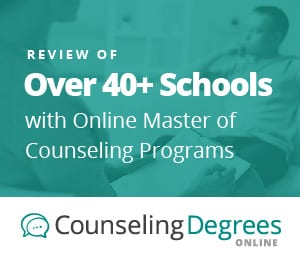 Walden University : MS in School Counseling (CACREP Accredited, five specializations to choose from)
Walden University : MS in School Counseling (CACREP Accredited, five specializations to choose from) Walden University : MS Dual Degree in Clinical Mental Health Counseling and School Counseling (CACREP Accredited, six specializations to choose from)
Walden University : MS Dual Degree in Clinical Mental Health Counseling and School Counseling (CACREP Accredited, six specializations to choose from) Walden University : MS in Clinical Mental Health Counseling (CACREP Accredited, six specializations to choose from)
Walden University : MS in Clinical Mental Health Counseling (CACREP Accredited, six specializations to choose from) Liberty University : MA: Addiction Counseling (100% online, 8-week courses)
Liberty University : MA: Addiction Counseling (100% online, 8-week courses) Grand Canyon University : Master's Degree in Counseling (Affordable Program with No Out of State Tuition)
Grand Canyon University : Master's Degree in Counseling (Affordable Program with No Out of State Tuition) Capella University : PsyD in School Psychology (CAEP accredited; Capella University is HLC accredited)
Capella University : PsyD in School Psychology (CAEP accredited; Capella University is HLC accredited) Liberty University : MSW: Social Work (100% online, 8-week courses)
Liberty University : MSW: Social Work (100% online, 8-week courses) Liberty University : MED: School Counseling (Online with required intensives)
Liberty University : MED: School Counseling (Online with required intensives) Liberty University : MA: Marriage and Family Therapy (Online with required intensives)
Liberty University : MA: Marriage and Family Therapy (Online with required intensives)While these areas of expertise were derived from the same educational root of psychology, both provide their own unique structure that can be beneficial to different clients with varying emotional and behavioral needs.
What is the difference between a counselor and a therapist?
The difference is marginal, but Counselors use proven techniques to assess, diagnose, and treat the people that come to them for help, while Therapists typically have a different license to focus on a wider range of therapy areas. Read on as we show you the primary differences, the pro's and con's, educational requirements, and the career options for each.
As you read through this guide, consider your most basic desire as a psychological professional in the field.
If there are certain groups you would like to influence in your career, or particular goals you wish to achieve while in the field, let these factors guide you into a degree program that is most suitable to help you along the way.
What is a Counselor?
One of the most common career fields for psychology-influenced students is counseling. Professionals that have achieved the rank of counselor within their organization can be very important and influential aspects in their client's lives. The role of the counselor can vary according to the needs of their client, making this an incredibly versatile field for those trained to provide guidance in the clinical setting.
Counselors use proven techniques to assess, diagnose, and treat the people that come to them for help. Common patients in the counseling setting may be those that have experienced loss in their lives, families struggling to find common ground, or even individuals within all age groups that have been diagnosed with mental health illnesses or disorders.
In some counseling jobs, you could work with people that have a specific diagnosis, such as depression, anxiety, or even schizophrenia. More common mental health disorders seen within the counseling setting include Intermittent Explosive Disorder, Attention Deficit Hyperactivity Disorder, and Bi-Polar Disorder.
As a counselor, your duties can begin with a general clinical assessment that leads you to create an effective and relevant treatment plan that is implemented over the course of several one-on-one sessions with your client. Depending on the needs of your patient, you may use different types of therapies to help each person achieve goals on the treatment plan.
Consider a Featured Online Counseling Program
| School and Program Information | Online Program? Entry Requirements |
Course Information |
|---|---|---|
| Walden University
MS in School Counseling
 CACREP Accredited CACREP Accredited |
✔ Online
GRE scores not required |
School counselors help students overcome obstacles and shape successful futures. Walden’s online MS in School Counseling program will give you a solid foundation in school counseling theories, approaches, and best practices while enabling you to gain hands-on experience. Learn More |
| Walden University
MS Dual Degree in Clinical Mental Health Counseling and School Counseling
 CACREP Accredited CACREP Accredited |
✔ Online
GRE scores not required |
The counseling field is in need of qualified, compassionate professionals like you to meet the demand for services. In Walden's clinical mental health counseling and school counseling dual degree program, you’ll gain the insights and hands-on training to positively impact the lives of children, adults, and families. Learn More |
| Walden University
MS in Clinical Mental Health Counseling
 CACREP Accredited CACREP Accredited |
✔ Online
GRE scores not required |
Mental health counselors play a valuable role in helping people cope with life’s challenges. Walden’s online MS in Clinical Mental Health Counseling program can help you become the competent, compassionate counselor you know you can be. Learn More |
| Liberty University
MA: Addiction Counseling
SACSCOC |
✔ Online
100% online, 8-week courses |
Our graduate degree in addiction counseling is designed to fulfill or exceed the requirements for many national and state board organizations. Online and on campus. Training Champions for Christ since 1971. Learn More |
| Grand Canyon University
Master's Degree in Counseling
HLC and NASAC Accredited |
✔ 100% Online
Over 14 Specializations Available |
Affordable with No Out of State Tuition Learn More |
| Capella University
PsyD in School Psychology
|
✔ Online
No GRE or GMAT. Master's and minimum 3.0 GPA |
Deepen your understanding of human behavior and advance your skills to help others with a degree in clinical psychology. Capella offers PsyD programs to help you develop leadership skills for your career. No GRE required. Learn More |
| Liberty University
MSW: Social Work
SACSCOC |
✔ Online
100% online, 8-week courses |
This program offers a general cognate and an individual and family clinical cognate. No matter which option you choose, you’ll receive advanced generalist training in social policy, research, and practice — as well as the opportunity to apply what you’ve learned in your field. Online and on campus. Training Champions for Christ since 1971. Learn More |
| Liberty University
MED: School Counseling
 CACREP Accredited CACREP Accredited |
✔ Online
Online with required intensives |
Liberty University’s CACREP-accredited Master of Education (M.Ed.) in School Counseling can help equip you to work as a school counselor in Christian, public, and private schools. Online and on campus. Training Champions for Christ since 1971. Learn More |
| Liberty University
MA: Marriage and Family Therapy
SACSCOC |
✔ Online
Online with required intensives |
A Liberty University marriage and family therapy master’s program online can prepare you to help individuals, couples, and families find healing through counseling. Online and on campus. Training Champions for Christ since 1971. Learn More |
*Sponsored Counseling Programs
Online CACREP Accredited programs | Online MPCAC Accredited programs
What is a Therapist?
When times get tough or life is delivering more difficult circumstances that one person can handle, therapy is often a groundbreaking factor that can change one's outlook of their own situation. Therapists can provide support to clients with a diverse set of needs, making them extremely life-changing for those on the brink of losing control.
Therapists differ from counselors in that their credentials can include a wide range of degree majors. Graduates from schools of social work, psychology, and even specialized areas such as Marriage and Family Therapy can become licensed therapists after meeting the educational and practical guidelines within their state.
In some areas of therapy, professionals hold degrees in the field of psychology rather than counseling. This discipline allows you to explore some of the scientific principles of behavior, different modes of testing, and varied treatment options currently used by other therapists in the field.
Pros and Cons of Each
Some students may find it beneficial to become involved in fields that revolve around their abilities in communication, consistency, and experience. Benefits to becoming a counselor can be relative to your goals as a professional, but can also include some of the standard known facts about the field itself.
Counselors
Counselors are utilized in many different branches of social services, research, mental health, and even in the healthcare field. Choosing a career path in counseling can set you up for a wide range of potential work settings throughout your career that is unmatched by many other major disciplines.
As a counselor, you can have access to jobs within different sectors of your community, but you may also be limited in the amount of support you can provide to your clients. In more widespread fields like social work and therapy, professionals may be permitted to partner with other agencies in an effort to surround their patients with an abundance of needed services.
Therapists
Therapists can also enjoy the benefit of being used in many different organizations within their community. Therapists can be found in private practice, partnered with healthcare professionals, or even in specialized clinics for behavioral, emotional, or even sports-related assistance.
Providing therapy to people in a clinical setting can be a fulfilling experience for those who meet the educational and practical expectations within their state. The cons associated with pursuing a career in this field include the lack of a generalized practice, which can limit you in the types of clients you serve.
Online Programs to Consider
The most preferred elements of institutional programs begin with convenience and ease of accessibility. This encompasses what is known about online programs, making them a prime option for you to consider when browsing through your choices. Counseling programs setting you on track for licensure should hold accreditation from the CACREP, making your search more centered around high-quality options in your area.
In the short list below, you can see a couple of online and accredited options currently offered to students with a counseling career in their sights. Whether you choose to pursue your certification through online or on-campus programs, accreditation and quality should be your primary considerations before moving forward.
- North Carolina Central University: Online Masters of Clinical Mental Health Counseling, School Counseling, and Career Counseling - CACREP Accredited
- Regent University: Online Masters of Clinical Mental Health Counseling, Marriage, Couples, and Family Counseling, and School Counseling - CACREP Accredited
The path to becoming a licensed therapist should consist of similar aspirations and considerations as the counseling track listed above. If you would like the most flexibility with your program, online options may be your best choice as you step into college programs within your field.
Since therapists can come from varying specializations and certification areas, you may have many more diverse degree programs to flip through in order to find your perfect fit. Some students find psychology-based master's degrees to be a great complement to their skills, while others may find social work or therapy-specific concentrations to be more reflective of their goals in the field. Take a look at a few accredited programs to review during your search beneath this section.
- California State University: Online Master of Clinical Social Work - CSWE Accredited
- Alliant International University: Online Masters in Marriage and Family Therapy - COAMFTE Accredited
 Walden University - MS in School Counseling (CACREP Accredited)
Walden University - MS in School Counseling (CACREP Accredited)
 Walden University - MS in Clinical Mental Health Counseling (CACREP Accredited)
Walden University - MS in Clinical Mental Health Counseling (CACREP Accredited)
 Liberty University - MA: Addiction Counseling (SACSCOC Accredited)
Liberty University - MA: Addiction Counseling (SACSCOC Accredited)
 Grand Canyon University - Master's Degree in Counseling (NASAC Accredited)
Grand Canyon University - Master's Degree in Counseling (NASAC Accredited)
 Capella University - PsyD in School Psychology (Capella University is HLC Accredited)
Capella University - PsyD in School Psychology (Capella University is HLC Accredited)
 Liberty University - MSW: Social Work (SACSCOC Accredited)
Liberty University - MSW: Social Work (SACSCOC Accredited)
 Liberty University - MED: School Counseling (CACREP and NCATE through CAEP Accredited)
Liberty University - MED: School Counseling (CACREP and NCATE through CAEP Accredited)
 Liberty University - MA: Marriage and Family Therapy (SACSCOC Accredited)
Liberty University - MA: Marriage and Family Therapy (SACSCOC Accredited)
Educational Requirements
An interesting perspective about the fields of counseling and therapy is that the degree requirements for both areas are centered around the master’s level. In order to obtain a career in the field of counseling, you are expected to engage in learning programs that result in your acquisition of a master’s degree in the field. Therapy candidates can also complete degree programs at the master’s level in order to be considered for a licensure in the future.
Finishing a master’s program at your school is not the only step to consider for entry into both of these fields. One of the most important experience requirements for counseling and therapy is your supervised clinical experience. This aspect usually occurs at points during your course work, as well as continuing after your graduation.
The field of counseling usually requires that you enroll in a Master of Counseling program or even alternative specialized options such as the Master of Clinical Mental Health Counseling, School Counseling, or even Career Counseling. Choosing a specialization can help you qualify for careers in the agencies that serve the purpose that is most closely related to your own personal mission.
People considering a career as a therapist can choose from the Master of Counseling program, Master of Social Work, or even the Master or Psychology as a large first step towards licensure in their field. Browsing the various forms of therapy and specialized practice available in the field can assist you with finding a program that gets you in touch with the population you would most like to serve.
Top Masters in Counseling Programs
- Masters in Counseling
- Online Masters in Counseling
- No GRE MA in Counseling
- Online Master of Arts in Counseling
- Schools with an Online Master of Counseling
- Accelerated MA in Counseling
- Hybrid MA in Counseling
- Dual Masters in Counseling Degrees
- By Online Counseling Program Specialization:
- Online Masters in Behavior Analysis
- Online Masters in Clinical Mental Health Counseling
- Online Masters in Counseling Psychology
- Online Masters in Mental Health Counseling
- Online Master of Rehabilitation Counseling
- Online Masters in School Counseling
- By Accreditation:
- Online CACREP Accredited Masters Programs
- Online MPCAC Accredited Programs
Classes to Take
- Ethics and Legal Issues: Enrollment in this course may include a look into the history and development of the field of mental health. Current trends leading the field, as well as the cultural expectations of professional mental health workers may be explored, providing upcoming professionals with a strong foundation and understanding of their practice in the professional environment. Current laws, regulations, and expectations may also be reviewed as part of learning in this class.
- Diagnosis and Assessment: The process of diagnosis beginning with a clinical intake should follow a certain set of guidelines followed by all mental health professionals. This course outlines the process by which professionals make clinical decisions that can dictate treatment for their patients. Students in this course may study and practice from the DSM-5 in an effort to become more familiar with common mental health illnesses and disorders, as well as the assessment processes available for use in clinical settings.
- Individual and Group Counseling/Therapy: Different methods and skills in your field can assist you in obtaining careers in diverse fields and help you work with a wide range of clients during your career. The dynamics of individual and group counseling and therapy can be very different depending on your specialization, making this course extremely important for your professional development. Communication, technique, and activity-introduction are just a few of the topics you can focus on in this course.
Counseling Licensure
In fields responsible for providing mental health services to the public, you should expect to see strict licensing requirements. Regardless of whether you choose a career path in the field of counseling or therapy, you might be expected to complete an accredited degree option as well as work through a clinical experience requirement.
Searching for accredited programs can be done by exploring the websites of popular accreditation agencies such as the CACREP and CSWE. These agencies can provide you with a list of verified online college programs to browse – even by state and current accreditation status.
Types of Counseling Licensure
- Counseling Licensure Guide
- State Counseling Licensure
- What It Takes to Become a Counselor
- LPC: Licensed Professional Counselor
- LMFT: Marriage and Family Therapist
- LCSW: Licensed Clinical Social Worker
- LMHC: Licensed Mental Health Counselor
- CCMHC: Certified Clinical Mental Health Counselor
- MAC: Master Addictions Counselor
- BCBA: Board Certified Behavior Analyst
- NCC: National Certified Counselor
- NCSC: National Certified School Counselor
- LCPC: Licensed Clinical Professional Counselor
- LPCC: Licensed Professional Clinical Counselor
Online counseling and therapy programs may also include practicum or internship components to assist you in getting started as a practitioner in your field. These experiences can contribute to your overall field requirements for licensure, which continues after you have received your degree.
Overall, most counseling and therapy field requirements generally consist of around 2 years of supervised experience in the field, which is completed under the direct supervision of a licensed professional. This allows you to gain your needed experience for licensure while helping clients work through pressing issues in their personal lives.
At the end of your clinical experience, you may be required to also pass a licensure examination and state law test that is specific to your state’s expectations of mental health professionals. Once you have progressed through these tests of your ability, you can be eligible for a license and ready to work in your community.
Careers Available to You
Counseling is a profession that can partner you with a wide range of clients with very different needs. Careers in this specialized area can be found in community mental health agencies, schools, and even businesses focused on providing the most support to their employees.
Specific career options in counseling can include Clinical Mental Health Counselors, School Counselors, Crisis and Trauma Counselors, and Career Counselors. Each specialized area may require a certain skill set, curriculum, and clinical experience in order to become involved, but offer its own benefits in terms of the affected population.
Therapists can also work in diverse agencies within their communities, including those focused on positive mental health and self-care. Therapists can also be contracted with state agencies in foster care and family services, which can be helpful for the improvement of relationships for children and their families.
Different specialized career choices can be made available depending on the type of degree program you completed during your educational experience. Students of social work and psychology can choose from a wide variety of concentrations in education, trauma, age-related specialties, and even therapy focused on particular populations.














